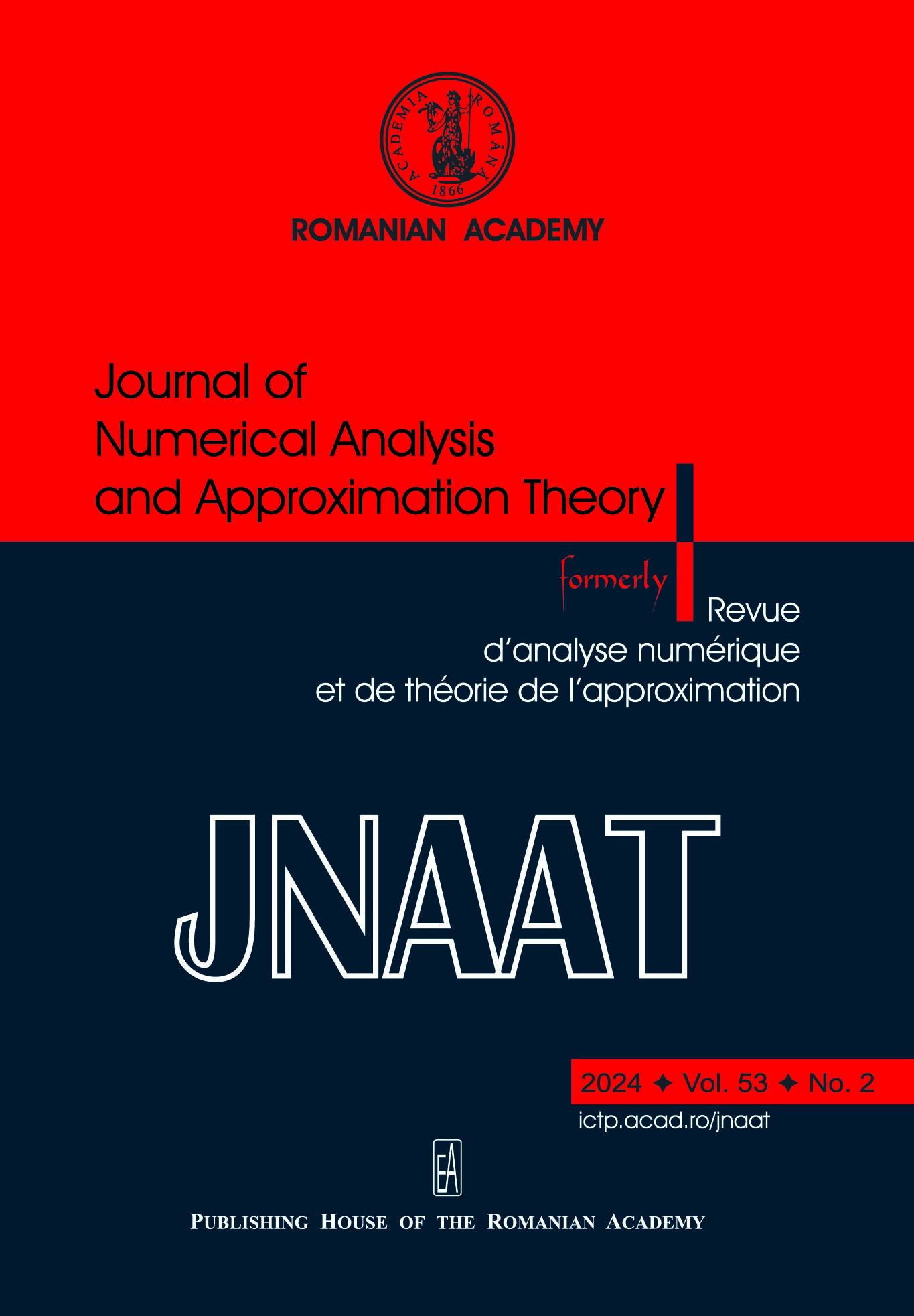Convergence of the θ-Euler-Maruyama method for a class of stochastic Volterra integro-differential equations
DOI:
https://doi.org/10.33993/jnaat532-1433Keywords:
Stochastic Volterra integro-differential equations, Θ-Euler-Maruyama method, strong convergence, H¨older continuity.Abstract
This paper addresses the convergence analysis of the θ-Euler-Maruyama method for a class of stochastic Volterra integro-differential equations (SVIDEs). At first, we discuss the existence, uniqueness, boundedness and H¨older continuity of the theoretical solution. Subsequently, the strong convergence order of the θ-Euler-Maruyama approach for SVIDEs is shown. Finally, we provided numerical examples to illustrate the theoretical results.
Downloads
References
M. Bayram, T. Partal, and G. Orucova Buyukoz, Numerical methods for simulation of stochastic differential equations, Advances in Difference Equations, 2018 (2018), pp. 1-10.
M. Bayram, T. Partal, and G. Orucova Buyukoz, Numerical methods for simulation of stochastic differential equations, Advances in Difference Equations, 2018 (2018), pp. 1-10, https://doi.org/10.1186/s13662-018-1466-5. DOI: https://doi.org/10.1186/s13662-018-1466-5
D. Conte, R. D’Ambrosio, B. Paternoster, et al., On the stability of ϑ-methods for stochastic volterra integral equations, Discr. Cont. Dyn. Sys.-Series B, 23 (2018), pp. 2695-2708, https://doi.org/10.3934/dcdsb.2018087. DOI: https://doi.org/10.3934/dcdsb.2018087
C.-S. Deng and W. Liu, Semi-implicit euler–maruyama method for non-linear time-changed stochastic differential equations, BIT Numerical Mathematics, 60 (2020), pp. 1133-1151, https://doi.org/10.1007/s10543-020-00810-7. DOI: https://doi.org/10.1007/s10543-020-00810-7
S. Federico, G. Ferrari, and L. Regis, Applications of stochastic optimal control to economics and finance, Basel: MDPI, 2020, https://doi.org/10.3390/books978-3-03936-059-8. DOI: https://doi.org/10.3390/books978-3-03936-059-8
D. J. Higham, Mean-square and asymptotic stability of the stochastic theta method, SIAM journal on numerical analysis, 38 (2000), pp. 753-769, https://doi.org/10.1137/S003614299834736X. DOI: https://doi.org/10.1137/S003614299834736X
C. Huang, Mean square stability and dissipativity of two classes of theta methods for systems of stochastic delay differential equations, Journal of Computational and Applied Mathematics, 259 (2014), pp. 77-86, https://doi.org/10.1016/j.cam.2013.03.038. DOI: https://doi.org/10.1016/j.cam.2013.03.038
G. Lan, M. Zhao, and S. Qi, Exponential stability of θ-em method for nonlinear stochastic volterra integro-differential equations, Applied Numerical Mathematics, 172 (2022), pp. 279-291, https://doi.org/10.1016/j.apnum.2021.10.012. DOI: https://doi.org/10.1016/j.apnum.2021.10.012
M. Li, C. Huang, and Y. Hu, Numerical methods for stochastic volterra integral equations with weakly singular kernels, IMA Journal of Numerical Analysis, 42 (2022), pp. 2656-2683, https://doi.org/10.1093/imanum/drab047. DOI: https://doi.org/10.1093/imanum/drab047
X. Mao, Stochastic differential equations and applications, Elsevier, 2007. DOI: https://doi.org/10.1533/9780857099402
X. Mao and L. Szpruch, Strong convergence and stability of implicit numerical methods for stochastic differential equations with non-globally lipschitz continuous coefficients, Journal of Computational and Applied Mathematics, 238 (2013), pp. 14-28. DOI: https://doi.org/10.1016/j.cam.2012.08.015
K. Nouri, H. Ranjbar, and L. Torkzadeh, Modified stochastic theta methods by odes solvers for stochastic differential equations, Communications in Nonlinear Science and Numerical Simulation, 68 (2019), pp. 336-346. DOI: https://doi.org/10.1016/j.cnsns.2018.08.013
T. Sauer, Computational solution of stochastic differential equations, Wiley Interdisciplinary Reviews: Computational Statistics, 5 (2013), pp. 362-371, https://doi.org/10.1002/wics.1272. DOI: https://doi.org/10.1002/wics.1272
W. Wang, L. Yan, S. Gao, and J. Hu, The truncated theta-em method for nonlinear and nonautonomous hybrid stochastic differential delay equations with poisson jumps, Discrete Dynamics in Nature and Society, 2021 (2021), pp. 1-17, https://doi.org/10.1155/2021/2882076. DOI: https://doi.org/10.1155/2021/2882076
X. Wang, J. Wu, and B. Dong, Mean-square convergence rates of stochastic theta methods for sdes under a coupled monotonicity condition, BIT Numerical Mathematics, 60 (2020), pp. 759-790, https://doi.org/10.1007/s10543-019-00793-0. DOI: https://doi.org/10.1007/s10543-019-00793-0
Z. Wang, Y. Gao, C. Fang, L. Liu, H. Zhou, and H. Zhang, Optimal control design for connected cruise control with stochastic communication delays, IEEE transactions on vehicular technology, 69 (2020), pp. 15357–15369,https://ieeexplore.ieee.org/document/9269005. DOI: https://doi.org/10.1109/TVT.2020.3040321
H. Yang and F. Jiang, Stochastic θ-methods for a class of jump-diffusion stochastic pantograph equations with random magnitude, The Scientific World Journal, 2014 (2014), https://doi.org/10.1155/2014/589167. DOI: https://doi.org/10.1155/2014/589167
W. Zhang, H. Liang, and J. Gao, Theoretical and numerical analysis of the Euler–Maruyama method for generalized stochastic volterra integro-differential equations, Journal of Computational and Applied Mathematics, 365 (2020), p. 112364, https://doi.org/10.1016/j.cam.2019.112364. DOI: https://doi.org/10.1016/j.cam.2019.112364
X. Zong and F. Wu, Choice of θ and mean-square exponential stability in the stochastic theta method of stochastic differential equations, Journal of Computational and Applied Mathematics, 255 (2014), pp. 837-847, https://doi.org/10.1016/j.cam.2013.07.007. DOI: https://doi.org/10.1016/j.cam.2013.07.007
X. Zong, F. Wu, and G. Xu, Convergence and stability of two classes of theta-milstein schemes for stochastic differential equations, Journal of Computational and Applied Mathematics, 336 (2018), pp. 8-29, https://doi.org/10.1016/j.cam.2017.12.025. DOI: https://doi.org/10.1016/j.cam.2017.12.025
Published
Issue
Section
License
Copyright (c) 2024 Samiha Mouchir

This work is licensed under a Creative Commons Attribution 4.0 International License.
Open Access. This article is distributed under the terms of the Creative Commons Attribution 4.0 International License, which permits unrestricted use, distribution, and reproduction in any medium, provided you give appropriate credit to the original author(s) and the source, provide a link to the Creative Commons license, and indicate if changes were made.










